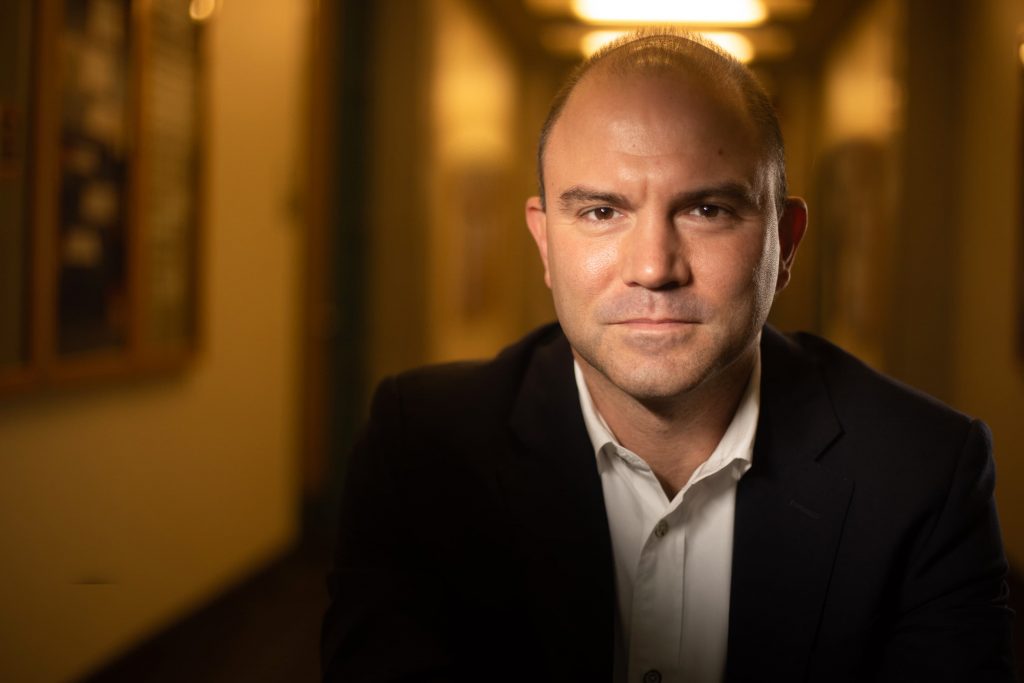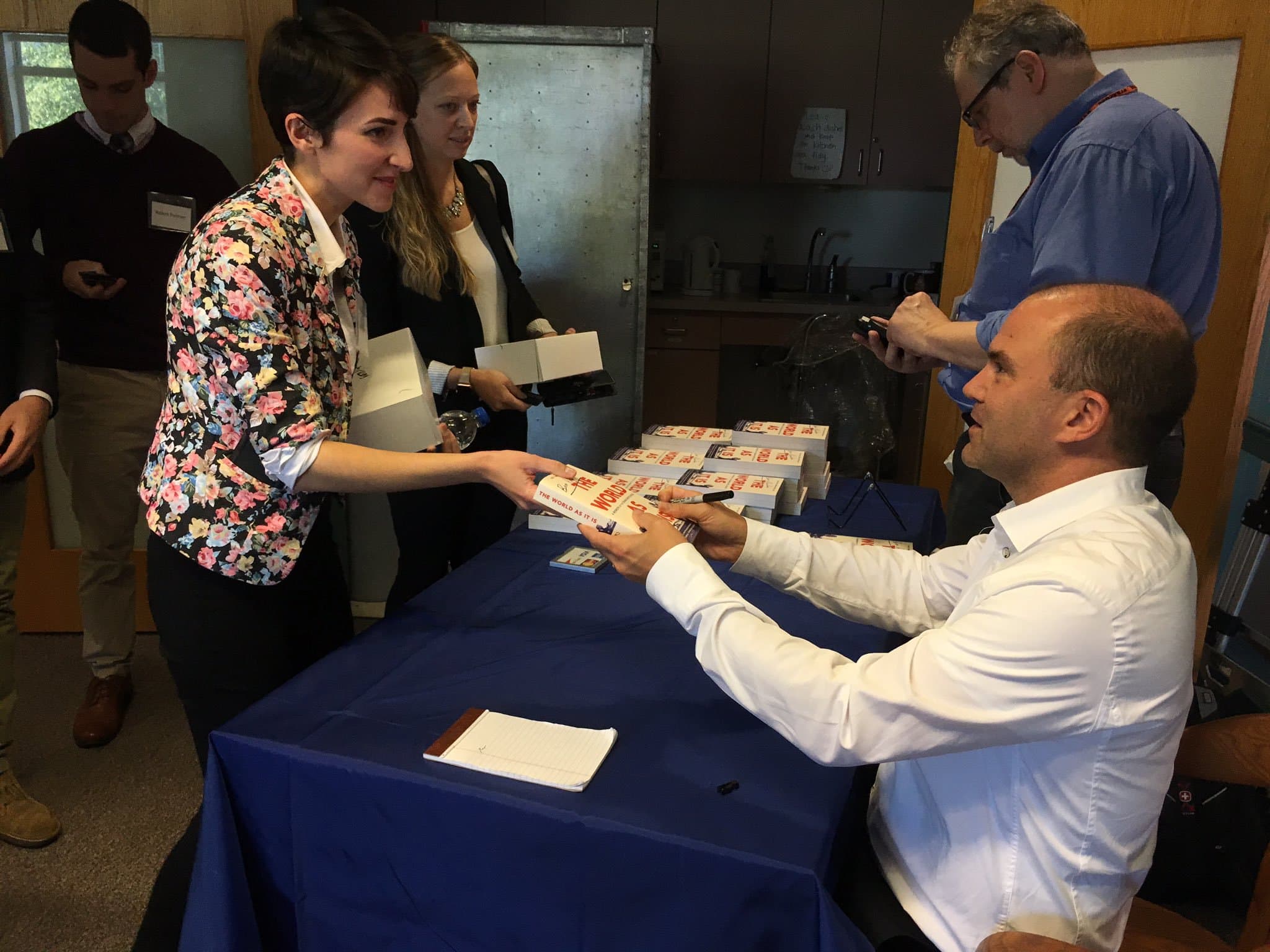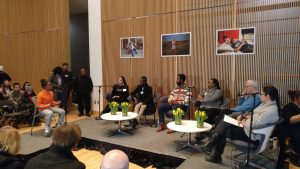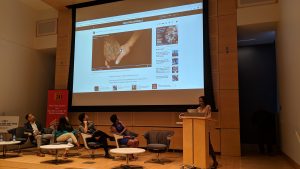Ben Rhodes urges a retelling of America’s story in the Digital Age
Ben Rhodes urges a re-telling of America’s story in the Digital Age

If anyone can speak to the drastic turn our country has taken since President Trump took office, it’s Ben Rhodes, President Obama’s former national security advisor and speechwriter.
Rhodes gave the keynote speech at Syracuse University’s 2019 Public Diplomacy Symposium on Friday, where he discussed contrasting global communications strategies between the Obama White House and the Trump White House in the age of social media and the era of fake news.
Maxwell Auditorium was filled with an array of professors, law students, graduate students and Newhouse students.
“President Obama used to say to me that our entire job in government was essentially to tell a really good story about America,” Rhodes said.
Rhodes explored the relationship between the progression of the digital age and our integrity as a country. As the methods of communication have increased and evolved since President Obama was in office, the former advisor stated that our values have deteriorated and our national identity has altered on a global scale.
Rhodes noted that during the Obama administration the role of social media was beneficial to U.S. foreign relations. It opened up conversations between the U.S. and other countries that wouldn’t have happened through the traditional channels.
He recalled how Twitter informed the White House of the fall of Tripoli before the officials in the Situation Room were aware of it; he talked about the deeper relationships U.S. citizens were able to have with people across the world because of the ability to connect via Facebook, Twitter and Instagram; he mentioned how pictures shared across social media platforms of Obama eating at a Vietnamese noodle shop inspired a greater mutual respect between the two nations.
In contrast, Rhodes also talked about how social media functions in the current administration as a disruptive and contentious platform.
“Social media, when I look back, was an incredibly empowering tool in 2010, 2011. But then what happened is, it was essentially reverse-engineered so that you could have an authoritarian government like Russia use it as a tool of disinformation and division against the West. Or, you could have an authoritarian government like China use it as a tool of mass surveillance. And that’s where we are right now,” Rhodes said.
The current age of disinformation and general public distrust were significant themes in his speech. Rhodes suggested that Russia realized the manipulative power of social media before any other nation. A mass amount of false information was spread through social media sites around the 2016 presidential election, and the U.S. had neither the tools nor the capacity to tell people what content they could or could not believe, he said. These lies disguised as facts have produced a strong sense of apathy among the American people, leaving many feeling as though they have no agency in the situation.
Rhodes urged the government to better educate the American people on what disinformation is and how to identify it, and called on the government to publicly expose and condemn disinformation when it is found.
This change in the geopolitical field—the transition from opening up global dialogues to fostering a fraught, hyper-politicized media environment—has rendered America’s story inconsistent, tumultuous and in a constant state of uncertainty. Polarized, distrustful, and combative, the voice of America that the world hears today is almost unrecognizable, Rhodes thinks, compared to the voice of America that he helped shape during his time in the White House.
When the digital age emerged, the U.S. discovered new ways to communicate with the world and with each other that promoted healthy debate and open discussions. Rhodes described how far we’ve strayed from the role we thought we once played on the global stage as a moral compass.
The former advisor said that we need to “[reintroduce] ourselves to the world” by galvanizing young people’s progressive intellect, educating the public on disinformation and reprioritizing the value of open, responsive, constructive communication, both domestically and abroad.
Once we recapture our voice, take ownership of our values and create an agenda that reflects what is really happening in the world, then we’ll be able to “tell our own story more aggressively,” Rhodes said. “And so as we think about how the United States… how our future administration communicates and engages foreign publics, we have to think about ourselves, because it starts with our own example.”

A Q&A with Ben Rhodes
Former national security advisor Ben Rhodes sat down for a Q&A with The NewsHouse before Syracuse University’s Public Diplomacy Symposium on Friday. Here’s what he had to say, away from the spotlight and crowd.
You’ve had quite a career path. Before you were one of the president’s top aides, you were an aspiring fiction writer. Now you’re an author and you continue to write about political matters. How did your effective communication skills and your great aptitude for language help you succeed as national security advisor?
Ben Rhodes: Well, one way to think about it is that politics is essentially storytelling. So what you’re doing in a speech, or what you’re doing in a political campaign, or what you’re doing in the white house, is telling a story to try to mobilize people on behalf of a set of goals. Having a background as a writer and having a background in literature gave me a sense of how you tell a story that resonates with people.
It also kind of gets me because my fiction writing background is a punchline for my critics. But I think it’s really important, and I think foreign policy is about trying to mobilize other nations around a story. [When] I was engaged in negotiations with Cuba, we were trying to tell a new story about how you turn the page on the past and how you open up a new relationship. But that has to take into account history and people and their concerns. And so to me, storytelling is the common thread that was critical to my work in both politics and foreign policy.
It’s been a hectic week in Washington with the whistleblower complaint that’s fueled the White House’s impeachment inquiry. Has there been anything particularly surprising or anything that worries you about what has come out so far?
BR: Yeah. I think what has come out definitely merits impeachment — if you basically extort a foreign government to investigate your political opponents and interfere in our democracy. That’s why impeachment is in the constitution; to prevent that kind of thing.
I think what worries me the most is that it didn’t seem that surprising that it was happening. We’ve kind of devolved so far in the last three years that it’s only natural that one would think that President Trump is engaged in that type of activity. And that’s what’s really worrying to me, having been in the White House, having seen the institution of the presidency up close, and to see it degraded to this extent where the fact that you would engage in that type of criminal activity and lie about it is basically what everybody expects. And that’s a big problem, the fact that this is even controversial and that he won’t likely be removed from office because of the Republican party. I think damage is being done to institutions in the country that goes beyond even just any one scandal. It’s going to take a long time to come climbing back from it.
In what’s been described, how do you see this as similar or different from your time in the White House with President Obama and with his calls to foreign leaders?
BR: It’s unimaginable that you would ever have a call like that. I’ve received a transcript of every single call the president had with foreign leaders, and I’ve staffed many calls, and you have an agenda that you work through. To bring your personal political interests into that would never even really occur to President Obama.
And frankly, I don’t think it would have occurred to previous presidents either — both parties. What’s come out and the whistleblower complaint suggest that [the Trump administration] essentially had set up a system to shield this kind of information from other people, the government who would normally have access to calls like this. That just shows you that they know what they’re doing isn’t correct. If they didn’t think this was a problem, they wouldn’t try to hide the transcript of the call. Both the nature of the call itself and how it was handled suggest a level of corruption that is completely unrecognizable.
While you were in the White House, you wrote a well-known speech that Obama delivered in Cairo, calling for a fresh slate between the US and Muslim-majority countries. That was in 2009. Now we’re here 10 years later in 2019. Can you talk about how you’ve seen things change in relations between the U.S. and Muslim-majority nations?
BR: Well, things have gotten worse. On the one end if you look at that speech, part of it was just laying out a series of objectives that President Obama had, some of which he ended up achieving like winding down the wars and ending torture and the Iran Nuclear Agreement.
Some he did not achieve, like an Arab-Israeli peace. But I think what’s happened in the Arab world in particular, everything got upended by the Arab Spring and all the tumult that brought to the region. And that made politics much more radicalized in terms of governments cracking down on people and some opposition forces becoming more extreme. At the same time, in the United States, we’ve also seen this kind of rise in Islamophobia targeting Muslims, [like] the Muslim ban.
However, I don’t necessarily think that negates what President Obama was trying to say. Because in a speech like that, you’re trying to lay out a worldview and you’re trying to lay out an alternative vision of how politics can work, and just because that’s not where things are today doesn’t mean that that’s not the right approach ultimately. I’ve talked to a lot of individuals around the world who still draw some inspiration from that speech in the work that they’re doing in civil society, or younger people in government, or what have you. So I think you have to look at politics and speeches like that in a very long frame.
It looked a certain way in 2009, it looks a different way today; hopefully it looks very different in 10 years. But I think that they’re both deep structural issues that need to be addressed in the Arab world that can only be addressed by the people in that region, not by us. At the same time, the most important thing we can and should do is set a better example than we are right now. And if you want to improve relations, the last thing we should be doing is keeping people out and scapegoating people.
Looking forward, the public is legitimately concerned about the security of our presidential elections. What are your thoughts on this and what steps do you think we should take to make sure our elections are secure?
BR: There are two sides to that question. One is just the basic security of the election itself. Can people hack into voting machines? Can results of the election itself be affected from abroad? They’re just very practical things you can do to secure your election systems. And I actually do think that a lot of work is being done in that regard, even if this White House doesn’t particularly care about it. That’s an extreme challenge, and I think it’s more likely than not that we’re able to secure our election systems.
Then, there’s a much different question of the kind of interference that we saw from Russia in 2016 where you essentially have foreign manipulation of social media and foreign money, in some ways, entering into American politics and aiming to help one candidate or hurt another, and aiming to divide Americans and demoralize Americans. This administration’s not going to do anything. If anything, they’re going to invite that kind of interference, as we’ve seen.
But people can do something about that, and I think individuals or organizations or even universities can help try to identify and understand disinformation. I think people misunderstand sometimes what the nature of that Russian interference was. Sure, there was hacking information and using it from the DNC and other individuals. But then there were the media that ran with that information and treated it as usually newsworthy, and basically did the work of the Russians for them in amplifying disinformation and efforts to discredit certain people.
And then, even more insidiously, the manipulation of people’s social media. The Russians knew that platforms on Facebook are open, and the Facebook algorithm can be manipulated by huge volumes of content. In this case, content that was negative about Hillary Clinton [was] disseminated and shared by Americans. I would hope that the technology companies like Facebook and Twitter and the consumers can be more vigilant in assessing where information is coming from and whether information is credible. You don’t have to allow if you’re a tech company, the manipulation of your platform. You can pull content down, you can try to determine where the content is coming from, and you don’t have to share that kind of content if you’re a consumer. Or you could at least try to scrutinize where it comes from.
I don’t think that we’re going to get that exactly right, but I do think that people are more aware this time around than they were last time about what the intentions might be behind certain information. We can at least mitigate some of the effects.
What advice would you give a journalism student in today’s environment, when the media and the credibility of journalists are largely undermined by Trump?
BR: I would say take some motivation from that. Trump wants to demoralize the media. He wants to demoralize people who want to be journalists. And you can either be demoralized or you can choose to work harder, can choose to see the value — the social value — in what you’re doing. In a way, it’s a more important time to be a journalist because the basic role of an independent media and society and democracy is under threat. That should be motivating.
I do think that it’s worth examining why the public is open to this message to some percent. And my own concern has been for some time that political journalism, in particular, does extraordinary work and has uncovered abuses and does shine a light on things, but at times can also be trivial. And particularly television and cable television politics are treated as sport. That’s turned some people off. Not just Trump voters, but people who see the shouting match, and everything is both sides in a back and forth. They don’t feel they’re actually being informed.
So, I think that’s a problem that’s separate from Trump. And again, that doesn’t indict all journalists, it just points to the need to focus on what really matters to people and what the consequences of decisions are, not just the reality show in Washington. I think the last thing is, it’s an interesting time because of huge challenges in media [like] media consolidation and the difficulty for local newspapers.
At the same time, though, people are still consuming content and they’re still consuming news. They’re just doing it in different ways. They’re watching television and reading newspapers, but they’re also consuming podcasts and they’re getting news on social media, on Snapchat and Instagram. See the opportunity in finding different ways to reach people, and finding different ways to tell stories, and finding ways to not lose sight of the core mission, which is to expose the truth and tell stories that explain what’s happening. But also, to evolve in how and where you’re telling the stories. That’s going to have to be a process that unfolds in the next 10 or 20 years.








